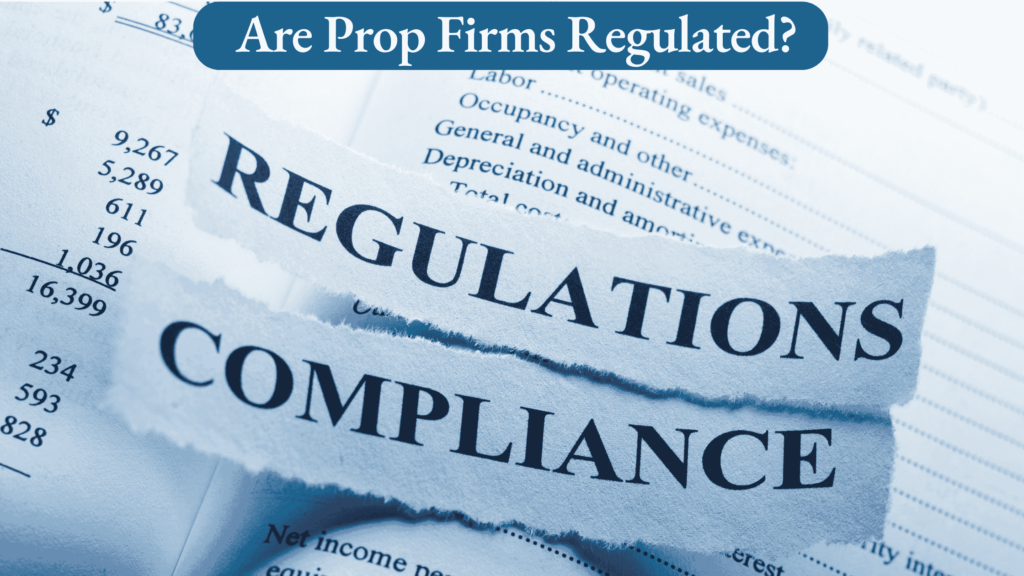Physical Address
304 North Cardinal St.
Dorchester Center, MA 02124
The world of forex prop trading is experiencing unprecedented scrutiny, with recent regulatory actions raising serious questions about the industry’s oversight. The recent shutdown of major players like My Forex Funds has sent shockwaves through the industry, prompting a closer examination of how prop firms operate and are regulated.
Are forex prop firms regulated? After extensive research, I have written this complete guide to help you understand how prop firms are regulated. Let’s dive in.

The prop trading landscape has undergone a dramatic transformation in recent years, particularly with the emergence of online platforms. While prop trading itself has existed for decades, the online model that has gained popularity in the last six years operates quite differently from its traditional counterparts. These changes have caught the attention of regulatory bodies worldwide, leading to increased scrutiny and enforcement actions.
Traditional prop trading firms have historically operated as brick-and-mortar businesses, providing real capital to traders who prove their worth through rigorous evaluation periods. These establishments follow a time-tested model that involves direct oversight, in-person training, and careful risk management. Their business model is straightforward: they invest actual capital in skilled traders who pass a prop firm evaluation, and then share the profits generated from successful trading activities.
The emergence of online prop firms has fundamentally altered the industry’s landscape. These newer entities often operate on a different model, introducing concepts like “simulated capital” and evaluation challenges. While this innovation has made prop trading more accessible to a global audience, it has also created new regulatory concerns. Many online firms have attracted scrutiny for their business practices, particularly those operating what regulators increasingly view as potentially unsustainable models.
The key distinction lies in how these firms handle capital allocation. Traditional firms invest real money, while many online platforms operate in a grey area with simulated accounts. This fundamental difference has significant implications for regulation and trader protection. The recent regulatory actions against prominent online prop firms highlight the growing concern about sustainability and trader protection in this sector.
The regulatory framework for prop firms varies dramatically depending on their location of operation. In the United States, prop trading firms face some of the most stringent regulations globally. The Dodd-Frank Act and Volcker Rule impose strict requirements on how these firms can operate, including detailed reporting requirements and limitations on certain trading activities. These regulations were implemented in response to the 2008 financial crisis and aimed to prevent excessive risk-taking.
Forex prop firms are legal in the United States. They operate within the regulatory framework set by financial authorities such as the Securities and Exchange Commission (SEC) and the Financial Industry Regulatory Authority (FINRA).
European Union-based firms operate under the comprehensive MiFID II regulatory framework. This system emphasizes transparency and investor protection, requiring firms to maintain detailed records of all trading activities and implement robust risk management systems. European regulators have taken a particularly active role in overseeing prop trading activities, working to ensure that firms operate in a manner that protects both traders and the broader financial system.

Prop firms are typically registered with the financial service regulator or similar authorities of the country in which they are registered. For example, FTMO is registered by the Municipal Court in Prague and is available to clients worldwide. However, regulatory hiccups have stopped the firm from accepting traders in the US.
The relatively light regulation of prop firms comes down to a fundamental difference in how they handle money, which can be understood through a simple analogy. Think of the difference between a bank and a private company that hires employees to manage its own money. The bank, which handles customer deposits and investments, is heavily regulated because it’s responsible for other people’s money. The private company, which only uses its own capital, faces much less oversight because it’s only risking its own funds.
Unlike brokers, investment advisors, hedge funds, or banks that directly handle client funds, prop firms typically use their own capital or operate through evaluation programs where traders aren’t depositing investment funds. When you join a prop firm, you’re essentially auditioning to manage their money, not investing your own capital (beyond evaluation fees).
Many prop firms have chosen to establish themselves in offshore jurisdictions, a decision that carries both advantages and potential risks. Locations like the Cayman Islands and British Virgin Islands offer more flexible regulatory environments and tax advantages. However, this flexibility comes with increased scrutiny from global regulatory bodies and potential challenges for traders seeking legal recourse in case of disputes.
Operating from an offshore jurisdiction doesn’t necessarily indicate illegitimate business practices, but it does require additional due diligence from traders. These firms must still maintain professional standards and implement proper risk management protocols to succeed long-term. The key lies in understanding how these jurisdictional choices affect trader protection and operational oversight.
Legitimate prop trading firms have developed sophisticated systems for evaluating and supporting traders. The process typically begins with a comprehensive evaluation period, during which traders must demonstrate consistent profitability while adhering to strict risk management parameters. This evaluation serves multiple purposes: it protects the firm’s capital, ensures traders understand proper risk management, and identifies those capable of generating consistent returns.
Successful prop trading operations maintain clear communication channels with their traders, provide detailed performance metrics, and offer comprehensive support systems. They implement robust risk management frameworks that protect both the firm and its traders from excessive losses. These practices aren’t just good business—they’re increasingly becoming regulatory requirements in many jurisdictions.
Industry experts anticipate significant regulatory changes in the coming years. The trend is clearly moving toward increased oversight, particularly for online prop firms. Regulators are likely to implement stricter requirements for capital allocation, enhanced transparency measures, and standardized reporting procedures. These changes will particularly impact firms operating with simulated capital, possibly leading to an industry-wide shift toward more traditional, real-money trading models.
Firms that have built their operations on sustainable, transparent practices are likely to thrive under increased regulation. Those operating with less sustainable models may face significant challenges or be forced to adapt their business practices. This evolution could lead to a more stable and trustworthy prop trading industry, ultimately benefiting serious traders.
For traders considering prop firm partnerships, conducting thorough due diligence is essential. This means examining a firm’s regulatory status, understanding their business model, and verifying their track record of trader success and prompt withdrawals. Pay particular attention to how the firm handles capital allocation and risk management—these are key indicators of a sustainable operation.
Documentation and contractual agreements require careful review. Understanding profit-sharing arrangements, trading restrictions, and withdrawal procedures is crucial. Legitimate firms provide clear, comprehensive documentation and are transparent about their operations and requirements. They also maintain proper fund segregation and implement secure payment processing systems.
Professional prop trading operations implement comprehensive risk management systems to protect both their capital and their traders. These systems typically include position size limits, maximum drawdown restrictions, and clear guidelines for trading during major news events. Understanding and adhering to these parameters really helps traders evaluate the pros and cons of prop trading before taking the plunge..
Firms should provide regular performance reports and maintain open communication channels with their traders. They should also have clear procedures for handling disputes and addressing trader concerns. The best firms invest in their traders’ success through education, technology, and support systems.
While prop firms operate differently from traditional brokerages, you can verify their legitimacy through several channels. Check if the prop trading firm is registered with financial regulators like the SEC or FINRA, and verify their relationships with regulated forex and commodity brokers. Most legitimate prop firms will display their regulatory affiliations and privacy policy prominently.
Yes, prop firms are completely legal entities that provide essential market liquidity through proprietary trading of forex, CFDs, and other instruments. Prop trading has existed for decades, with traditional prop firms managing their own capital through skilled traders. While online prop firms face more scrutiny than traditional trading firms, both models are legal when operated properly.
Prop firms in the US operate under a complex regulatory framework overseen by multiple regulators including the SEC, FINRA, and CFTC. A prop trading firm must follow specific guidelines when trading securities, commodities, or forex, though these requirements differ from those governing traditional brokerages because prop firms trade their own capital rather than client funds.
While prop firms face lighter regulation than brokers handling client funds, many choose to operate under regulatory oversight to build credibility. The key distinction is that prop firms use their own capital, unlike brokerages that handle customer investments. However, regulators are increasingly monitoring prop trading activities to ensure market stability.
Starting a prop firm requires different licenses depending on your trading activities and location. A prop trading firm dealing in securities or forex needs specific registrations with regulators, though requirements are less stringent than for traditional brokerages. Any trader considering starting a prop firm should consult with financial compliance experts.
Prop firms face lighter regulation because they trade with their own capital rather than managing client investments. Unlike a broker who handles customer funds, a prop firm simply lets traders use its own capital for trading. This fundamental difference means regulators focus more on overseeing brokerages that handle client money than prop trading operations using proprietary capital.
The forex prop firm industry stands at a crucial juncture in 2024. While current regulation varies widely by jurisdiction, the trend toward increased oversight is clear. This evolution, while potentially challenging for some operators, should ultimately create a more stable and trustworthy environment for serious traders.